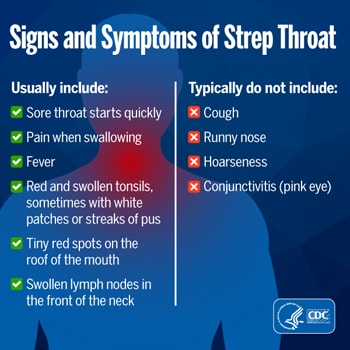Other symptoms may include a headache, stomach pain, nausea, or vomiting — especially in children. Someone with strep throat may also have a rash; it is known as scarlet fever.
Strep Throat: All You Need to Know

Worried your sore throat may be strep throat? Doctors can do a quick test to see if a sore throat is strep throat. Antibiotics can help people with strep throat feel better faster and prevent spreading it to others.
On This Page
- Bacteria cause strep throat
- How you get strep throat
- Pain, fever, but no cough is common
- Some people are at increased risk
- A simple test gives fast results
- Antibiotics are used for treatment
- Not everyone needs antibiotics
- Serious complications are not common
- Protect yourself and others
Bacteria cause strep throat
Viruses cause most sore throats. However, strep throat is an infection in the throat and tonsils caused by bacteria called group A Streptococcus (group A strep).
How you get strep throat
Group A strep bacteria are very contagious. Generally, people spread the bacteria to others through
- Respiratory droplets
- Direct contact
Rarely, people can spread group A strep bacteria through food that is not handled properly (visit CDC’s food safety page).
It usually takes two to five days for someone exposed to group A strep bacteria to become ill with strep throat.
Respiratory droplets
Group A strep bacteria often live in the nose and throat. People who are infected spread the bacteria by talking, coughing, or sneezing, which creates respiratory droplets that contain the bacteria.
People can get sick if they:
- Breathe in respiratory droplets that contain the bacteria
- Touch something with those droplets on it and then touch their mouth or nose
- Drink from the same glass or eat from the same plate as a person infected with group A strep bacteria
Direct contact
People can also spread group A strep bacteria from infected sores on their skin. Other people can get sick if they:
- Touch sores on the skin caused by group A strep bacteria (impetigo) or come into contact with fluid from the sores
It is important to know that some infected people do not have symptoms or seem sick. People sick with strep throat are much more contagious than those who do not have symptoms.

A sore throat that starts quickly, pain with swallowing, and fever are some of the common signs and symptoms of strep throat.
Pain, fever, but no cough is common
In general, strep throat is a mild infection, but it can be very painful. The most common symptoms of strep throat include:
- Sore throat that can start very quickly
- Pain when swallowing
- Fever
- Red and swollen tonsils, sometimes with white patches or streaks of pus
- Petechiae — pronounced pi-TEE-kee-eye — on the soft or hard palate (tiny, red spots on the roof of the mouth)
- Swollen lymph nodes in the front of the neck
Other symptoms may include a headache, stomach pain, nausea, or vomiting — especially in children. Someone with strep throat may also have a rash; it is known as scarlet fever.
Some symptoms suggest a viral cause rather than group A strep
The following symptoms suggest a virus is the cause of the illness instead of strep throat:
- Cough
- Runny nose
- Hoarseness (changes in your voice that make it sound breathy, raspy, or strained)
- Conjunctivitis (pink eye)
Strep throat: More common in children
- Up to 3 in 10 children with a sore throat have strep throat
- About 1 in 10 adults with a sore throat has strep throat
Some people are at increased risk
Anyone can get strep throat, but there are some factors that can increase the risk of getting this common infection.
Age
Strep throat is more common in children than adults. It is most common in children 5 through 15 years old. It is very rare in children younger than 3 years old.
Adults who are at increased risk for strep throat include:
- Parents of school-aged children
- Adults who are often in contact with children
Group settings
Close contact with another person with strep throat is the most common risk factor for illness. For example, if someone has strep throat, the bacteria often spread to other people in their household.
Infectious illnesses tend to spread wherever large groups of people gather. Crowded settings can increase the risk of getting a group A strep infection. These settings include:
- Schools
- Daycare centers
- Military training facilities
A simple test gives fast results
A doctor will determine what type of illness you have by asking about symptoms and doing a physical exam. If they think you might have strep throat, they will swab your throat to test for strep throat. There are two types of tests for strep throat: a rapid strep test and throat culture.
Rapid strep test
A rapid strep test involves swabbing the throat and running a test on the swab. The test quickly shows if group A strep bacteria are causing the illness.
- If the test is positive, doctors can prescribe antibiotics.
- If the test is negative, but a doctor still suspects strep throat, then the doctor can take a throat culture swab.
Throat culture
A throat culture takes time to see if group A strep bacteria grow from the swab. While it takes more time, a throat culture sometimes finds infections that the rapid strep test misses.
Culture is important to use in children and teens since they can get rheumatic fever from an untreated strep throat infection. For adults, it is usually not necessary to do a throat culture following a negative rapid strep test. Adults are generally not at risk of getting rheumatic fever following a strep throat infection.
Antibiotics are used for treatment
Doctors treat strep throat with antibiotics. Benefits of antibiotics include:
- Decreasing how long someone is sick
- Decreasing symptoms (feeling better)
- Preventing the bacteria from spreading to others
- Preventing serious complications like rheumatic fever
Someone with strep throat should start feeling better in just a day or two after starting antibiotics. Call the doctor if you or your child are not feeling better after taking antibiotics for 48 hours.
When to return to work, school after illness
People with strep throat should stay home from work, school, or daycare until they:
- No longer have a fever
- Have taken antibiotics for at least 12 hours
Antibiotic dos and don’ts
- Do take the prescription exactly as the doctor says to.
- Don’t stop taking the medicine, even if you or your child feels better, unless the doctor says to stop.
You can find more guidance on taking antibiotics on CDC’s Antibiotic Do’s & Don’ts Page.
Not everyone needs antibiotics
Someone who tests positive for strep throat but has no symptoms (called a “carrier”) usually does not need antibiotics. They are less likely to spread the bacteria to others and very unlikely to get complications.
If a carrier gets a sore throat illness caused by a virus, the rapid strep test can be positive. In these cases, it can be hard to know what is causing the sore throat.
If someone keeps getting a sore throat after taking the right antibiotics, they may be a strep carrier and have a viral throat infection. Talk to a doctor if you think you or your child may be a strep carrier.
Serious complications are not common
Complications can occur after a strep throat infection. This can happen if the bacteria spread to other parts of the body.
Complications can include:
- Abscesses (pockets of pus) around the tonsils or in the neck
- Swollen lymph nodes in the neck
- Sinus infections
- Ear infections
- Rheumatic fever (a disease that can affect the heart, joints, brain, and skin)
- Post-streptococcal glomerulonephritis (a kidney disease)

Wash your hands often to help prevent germs from spreading.
Protect yourself and others
People can get strep throat more than once. Having strep throat does not protect someone from getting it again in the future. While there is no vaccine to prevent strep throat, there are things people can do to protect themselves and others.
Good hygiene
The best way to keep from getting or spreading group A strep is to wash your hands often. This is especially important after coughing or sneezing and before preparing foods or eating.
To prevent group A strep infections, you should:
- Cover your mouth and nose with a tissue when you cough or sneeze.
- Put your used tissue in the waste basket.
- Cough or sneeze into your upper sleeve or elbow, not your hands, if you don’t have a tissue.
- Wash your hands often with soap and water for at least 20 seconds.
- Use an alcohol-based hand rub if soap and water are not available.
You should also wash glasses, utensils, and plates after someone who is sick uses them. These items are safe for others to use once washed.
Antibiotics
Antibiotics help prevent someone with strep throat from spreading the bacteria to others.
How to Treat Strep Throat
It’s important to take the full course of antibiotics you’re prescribed to avoid complications of strep.
By Quinn Phillips Medically Reviewed by David L. Causey, MD
Reviewed: August 18, 2022

Strep throat is a bacterial infection that mainly affects children and adolescents, but it is possible for anyone to catch it.
You can get strep throat by coming in contact with secretions from an infected person’s respiratory tract, such as when someone coughs or sneezes.
Signs of strep throat include a very red throat that may have white patches, as well as fever, body aches and chills, pain when swallowing, and swollen lymph nodes in your neck.
You can’t identify strep throat based on its symptoms alone. A doctor will need to do a throat swab and order at least one test to make a definitive diagnosis.
It’s very important to see a doctor for diagnosis and treatment if you suspect you may have strep throat. Failure to do so may lead to a number of complications, some of which can cause lasting damage or even threaten your life. (1,2,3)
Antibiotics for Strep Throat
The main treatment for strep throat is a course of antibiotics.
Your doctor will prescribe antibiotics only if you’ve been given a clear diagnosis of strep infection, which is confirmed by testing a throat swab.
More than two-thirds of sore throats are caused by viruses, not bacteria, and there are several risks to taking an antibiotic for a viral infection. Besides medication side effects, there is a greater potential for antibiotic resistance in the future, according to Nipunie S. Rajapakse, MD, a pediatric infectious disease specialist at the Mayo Clinic in Rochester, Minnesota.
Penicillin and amoxicillin are the two standard antibiotic treatments for strep throat. Either option is taken by mouth for 10 days.
In rare cases when someone can’t swallow effectively, injected penicillin may be used instead.
Treating Tonsillitis: What You Need to Know
Treatment for Urinary Tract Infections: Antibiotics, Medication, and Home Remedies
Treatments for Staph Infection: Antibiotics, Surgery, and More
“Thankfully, Group A strep bacteria is 100 percent susceptible to these antibiotics,” notes Dr. Rajapakse. “We’ve never found any isolates that are resistant.”
In cases where a patient is allergic to penicillin or amoxicillin, another family of antibiotics may be substituted.
In these situations, “The only difference is that, often, we’ll have to test the specific type of strep the person has to make sure that the antibiotics work against it,” says Rajapakse.
Once you start taking antibiotics, you’ll still be contagious for about 24 hours. During this time, it’s important to take precautions not to spread your infection — such as staying home, washing your hands, and not coughing or sneezing uncovered or onto your hands. Group A strep pharyngitis is most commonly spread through direct person-to-person transmission.
Taking antibiotics for strep throat has two main benefits: reducing symptoms and preventing complications.
“We know that treating patients with antibiotics shortens their length of symptoms,” Rajapakse notes. But preventing complications may be even more important, since even though they’re uncommon, they can be severe.
Potential complications from untreated strep throat include an infected mass in the area around your tonsils, a rare kidney disease called post-streptococcal glomerulonephritis, rheumatic heart disease, and an inflammatory condition called rheumatic fever — all of which can require lifesaving hospitalization and cause lasting damage.
People who have repeated strep infections of their tonsils may need to have their tonsils removed (tonsillectomy).
There’s no need to get tested again for strep bacteria after your course of antibiotics is complete, assuming your symptoms have cleared up.
In fact, Rajapakse says, testing for strep in people without symptoms can be harmful because some people carry the bacteria without it causing any harmful symptoms.
“If you do swabs on people who don’t have symptoms, you’re just finding these carriers who don’t benefit from antibiotics,” she notes. (1,2,3)
Asymptomatic people with strep are also much less likely to transmit it to others or develop complications.
Research is underway to develop a Group A strep vaccine, but none are available to patients yet.
Home Remedies to Treat Throat Pain and Discomfort
In addition to taking your prescribed antibiotics — or if you have a viral infection rather than strep throat — there are several steps you can take to increase your comfort level:
- Take pain relievers. Over-the-counter pain relievers like ibuprofen (Advil, Motrin) and acetaminophen (Tylenol) may help relieve throat pain and reduce fever. Be careful when it comes to aspirin — it should never be given to children recovering from chicken pox or flu-like symptoms, since it can cause a rare but serious condition called Reye’s syndrome.
- Drink hot beverages. Warm drinks like tea can soothe your throat, especially if you add lemon and honey.
- Or, try cold beverages. Some people may prefer the effect of cold beverages or even popsicles on their throat, since cold has inherent pain-relieving properties.
- Suck on throat lozenges. Many throat lozenges have pain-relieving (analgesic) ingredients, and all of them can help soothe your throat by increasing the flow of saliva.
- Try gargling with salt water. Dissolve 1/2 teaspoon (tsp) of salt in 1 cup warm water, and gargle with this solution several times a day to see if it improves your symptoms.
- Use a humidifier. If your home or bedroom has dry air, using a humidifier or cool-mist vaporizer may help soothe your throat. Note that if you have allergies, a humidifier may make your symptoms worse. Also, be sure to follow the manufacturer’s instructions for cleaning out your humidifier regularly to avoid the buildup of mold and other particulate matter, which can make allergies worse. (3,4)






